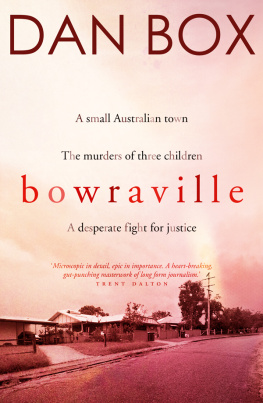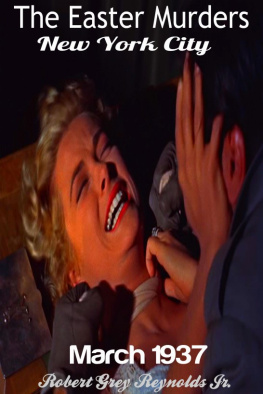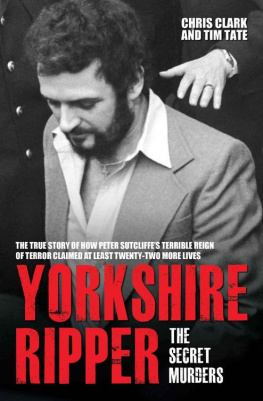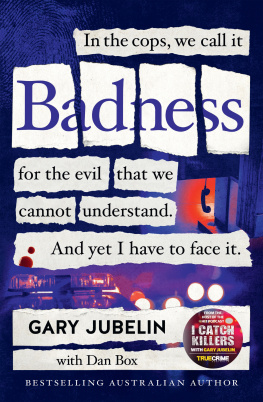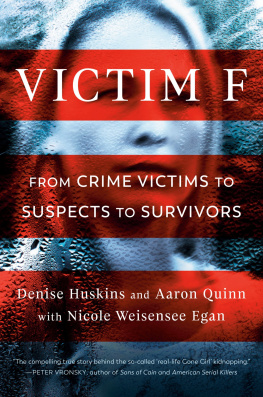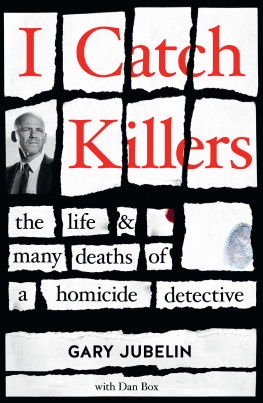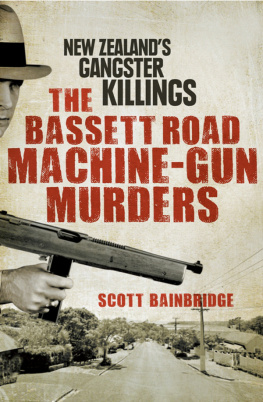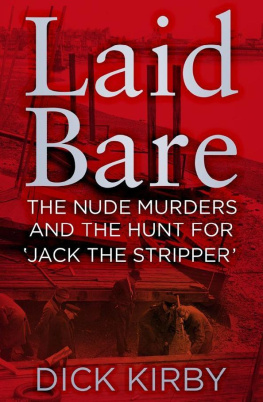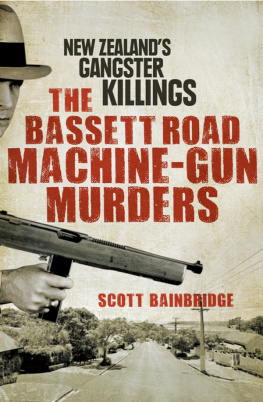About the Book
From the creator of the Walkley Awardwinning podcast comes the story of a small Australian town, the murders of three children and a desperate fight for justice.
A true crime story cannot often be believed, at least at the beginning. In Bowraville, all three of the victims were Aboriginal. All three were killed within five months, between 1990 and 1991. The same white man was linked to each, but nobody was convicted.
More than two decades later, homicide detective Gary Jubelin contacted Dan Box, asking him to pursue this serial killing. At that time, few others in the justice system seemed to know or care about the murders in Bowraville. Dan spoke to the families of the victims, Colleen Walker-Craig, Evelyn Greenup and Clinton Speedy-Duroux, as well as the lawyers, police officers and even the suspect involved in what had happened. His investigation, as well as the families own determined campaigning, forced the authorities to reconsider the killings. This account asks painful questions about what justice means and how it is delivered, as well as describing Dans own shifting, uncomfortable realisation that he was a reporter who crossed the line.
A major theme in this story is that of the Maangun the Law by which anyone responsible for anothers death accepts that there must be pay-back.
The conviction of the guilty is a public interest, as is the acquittal of the innocent.
He asked me if I did it and I said No. Thats it.
Sunday, 16 September 1990
It was only three days after Colleen had gone missing that anybody told her mother, Muriel Craig, and the news made no sense to her. No sense to her at all. They told her Colleen had been at a party. On the Mission in Bowraville. The party was at Freds place; opposite the Tree of Knowledge. The house at number 4, on Cemetery Road.
Muriel had driven down that morning from her home in Sawtell, less than an hour from Bowraville, just further up the coast. When she went to the Bowraville police station, she couldnt get an answer to her knocking. Maybe it was shut up for the Sunday. She tried again on Monday, climbing High Street to the hilltop, walking through the gate in the white picket fence outside the neat, Federation building and this time, finding the door open, walking in, out of the sunlight, and ringing the bell on the counter inside. The policeman in his blue uniform looked up and saw her standing there, but took his time to answer. Muriel told him that Colleen was missing. Her daughter was sixteen, she said.
How long has she been missing for? the policeman asked her.
Well, they said she was missing the Thursday night and its Monday.
Muriel showed the man a photograph: Colleen looking confident and beautiful, with red lips just about to smile.
This is your daughter? he asked her, doubtful. She doesnt look Aboriginal. Colleen had pale brown skin their family had some white blood in it. The policeman didnt take a statement. He filled out some paperwork. Maybe he told her Colleen had gone walkabout Muriel isnt certain. Its been so long since it happened and its so hard to remember, what with the fear and the emotion.
Muriel said nothing. She couldnt backchat the police.
It seemed they were not going to help her. Instead, Muriel went home, gathered up her remaining, younger children and moved the family to Bowraville, a small town of something like a thousand people that nestled in a loop of the green Nambucca River on the mid-north coast of New South Wales. There she spent her days driving up and down the Mission, which was just the eight brown-brick houses built along one side of the long stretch of Cemetery Road, pleading or demanding that people tell her if they had seen her daughter. But people only told her fragments. Some said that theyd seen Colleen drinking at the party. Some said theyd seen her outside, where the music and the people had spilled out that night across the road. But the times and names and details were all different. Muriel had to fit these broken pieces back together into a whole.
Michelle Flanders, who got to the party around 8.30 p.m. after finishing her work at the play centre on the Mission, said she found her boyfriend drinking and singing with about eight other boys when she arrived. The drinking had started early but he got up when he saw her and the two of them walked outside number 4, through the wire gate and across the pitted bitumen to where Colleen was sitting underneath the spreading white mahogany they called the Tree of Knowledge. She was one of those gathered round the fire with Kelly Jarrett, who was celebrating her eighteenth birthday. James Hide was there with them and some others who Michelle could not remember. The boys were smoking yarndi, or marijuana, while the girls were drinking Passion Pop. When the couple arrived, James handed them a stubbie but Michelles boyfriend spat it out and told him, Thats not beer.
It smelled like bourbon, Michelle thought.
For Muriel, the story got more confusing. The party was at the home of Fred Buchanan, who was Colleens cousin. Fred later remembered that hed been drinking all day in the house, sitting in his bedroom with the other blokes before crashing out at about 8 p.m. Colleen had come late to the party and hadnt stayed there. She was wearing a white jumper with a blue-and-red band and light blue jeans cut short to the knee, he remembered.
Fred said Colleen had walked into the bedroom, holding a bottle of Passion Pop and talking about catching the train to Goodooga in the morning. Goodooga was out west, more than a days journey from Bowraville via Sydney. After the party, he heard that a white Holden Commodore had come along outside and someone from inside had called out, Uncle George, where are you going? It sounded like it had been Colleen talking, someone told him, though Fred didnt see or hear it for himself. He blacked out and woke up something like twelve hours later, long after the early morning train for Goodooga had gone.
Martin George Greenup was drinking in the lounge room at the party with James Hide, who was the only white man among the crowd of blackfellas, and remembered that he overheard James saying, Come on babe, Colleen, I want to see you tonight. Colleen got upset, walked outside the house, and sat on the front step. She was a pretty girl, with dark, curling hair and an easy smile. She looked like her mother, Muriel.
Sometime around two or three in the morning, after the other boys had finished drinking and crashed out, Martin said that he had left the party and seen a white Commodore parked outside up the road, facing towards the cemetery. Colleen, who was in the front seat, waved and sung out, See ya later, Uncle Martin.
See ya later, Col, he told her.
Or maybe Colleen was sitting in the back seat and yelled out How you going, Uncle George? It was hard to remember. Anyway, as he was walking away from the party, the Commodore drove past him, heading into Bowraville.
Muriel kept searching for her daughter, trying to make sense of all these different versions, but what people were saying wasnt straightforward or it changed with each telling or what one person said was contradicted by another. One of Colleens cousins said hed seen her two days after the party, talking about the footy knockout tournament she was due to go to. Kelly Jarrett, whose birthday party it had been that night, told Muriel that she last saw Colleen outside at the party. The two of them had gone over to Freds house and stayed there drinking. At about 11.30 p.m. Colleen had come over to where Kelly was standing by the fire. But after that, she hadnt seen her.

